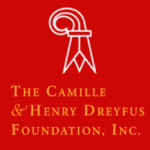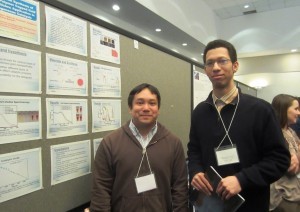 Oglethorpe University’s Chemistry department has been awarded a $5,000 grant to develop undergraduate lab experiments in the area of polymer and materials science. The grant in part funds stipends for three Oglethorpe student research assistant positions, awarded to Deon Heavens, Serlin Singh, and Esteban Delgado.
Oglethorpe University’s Chemistry department has been awarded a $5,000 grant to develop undergraduate lab experiments in the area of polymer and materials science. The grant in part funds stipends for three Oglethorpe student research assistant positions, awarded to Deon Heavens, Serlin Singh, and Esteban Delgado.

Dr. Gregory Gabriel (left) at the Southeastern Undergraduate Research Conference in February 2016.
Oglethorpe’s award was allocated from a larger grant from the Dreyfus Foundation to eight higher education institutions, ranging from liberal arts universities (such as Williams College and Oglethorpe) to large research centers (including the University of Southern Mississippi and the U.S. Air Force Academy).
With this grant, the schools will: (1) develop a public program focused on undergraduates interested in polymer science and engineering, in response to a recent American Chemical Society initiative, and (2) establish PUNK (Polymer Undergraduate Network of Knowledge), an online resource portal primarily serving undergraduate chemistry and chemical engineering instructors.
“I am excited that Oglethorpe is part of this initiative,” said Dr. Gregory Gabriel, assistant professor of chemistry, who secured the grant and will be leading the efforts at Oglethorpe. “I look forward to having the ability to compensate three students—with external funds—and in doing so, keep their talents right here on the Oglethorpe campus in the summer.” The American Chemical Society’s initiative aims to better integrate polymer science into the introductory and foundational courses of chemistry programs, and to enhance student interest through their understanding of real-world applications of chemistry. A highly interdisciplinary field, macromolecular chemistry cuts across the five foundation areas of chemistry: organic, analytical, physical, inorganic, and biochemistry. PUNK will be a valuable resource to help instructors to accomplish this and to prepare their students to be effective scientists. The resources that are developed and posted on PUNK will facilitate an instructor’s inclusion of the principles of polymer chemistry, engineering, and physics into an existing undergraduate course or into one that is to be developed.
The American Chemical Society’s initiative aims to better integrate polymer science into the introductory and foundational courses of chemistry programs, and to enhance student interest through their understanding of real-world applications of chemistry. A highly interdisciplinary field, macromolecular chemistry cuts across the five foundation areas of chemistry: organic, analytical, physical, inorganic, and biochemistry. PUNK will be a valuable resource to help instructors to accomplish this and to prepare their students to be effective scientists. The resources that are developed and posted on PUNK will facilitate an instructor’s inclusion of the principles of polymer chemistry, engineering, and physics into an existing undergraduate course or into one that is to be developed.
“I expect the Goslin (science) building to be buzzing with research news from chemistry, biology, and physics in the coming months,” said Dr. Gabriel. “We plan to disseminate our results through publications and national meetings in the next three years. While much of the work will take place over the summer, we expect these projects to grow in scope and impact as we share our results and support future grant proposals.”
